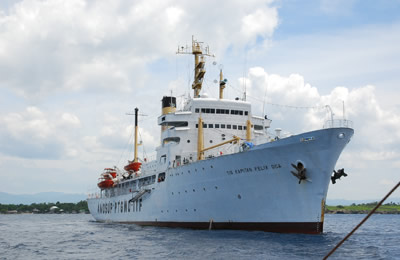
Japan will promote the ‘Onboard Training Environment Promotion Project’ as the ‘International Cooperative Training Project for Asian Seafarers’—based on the ‘ASEAN Japan Seafarer Training Cooperative Program’—by the following specific measures:
1. Coordination with the Philippine government
For the promotion of the project, the Japanese and Philippine governments signed a memorandum featuring the following matters (in March 2009):

- In order to cope with the issue of the worldwide shortage of seafarers, both parties shall make efforts to upgrade the competency of Asian seafarers by jointly implementing this program.
- Japan shall provide funds, knowhow and human resources necessary for the effective and efficient implementation of the project and encourage the private sector to offer cooperation in the project.
- The Philippine government shall encourage the private sector, maritime universities and training facilities to cooperate in the project, and publicize the project all over the country. They also shall monitor and evaluate the progress of the project and study the use of appropriate public development aid programs for the implementation.

2. Use of the training ship owned by the Philippines
In order to actively promote the Onboard Training Environment Promotion Project, we intend to transfer the knowhow of shipboard training nurtured in our country to Philippine instructors serving on board the training ship Oca (hereinafter called T.S. Oca: former T.S. Seiun Maru of National Institute for Sea Training) operated by the Maritime Academy of Asia and the Pacific. The practical training on board the T.S. Oca, which will be followed, in continuation, by additional training on board merchant ships—opportunities offered by our shipping companies—is expected to resolve the problem of students dropping out because of the shortage of such opportunities.
In order to make full use of the T.S. Oca, the private sector of our country is to offer support by providing scholarships for students, by improving shipboard facilities, and by bearing its operating costs. On the other hand, the public sector is to give aid in technical matters necessary for shipboard training, such as the preparation of curriculums.

3. Dispatch of instructors of the National Institute for Sea Training
The T.S. Oca was repaired in March 2009 by the support of the private sector of our country, which improved shipboard facilities to make the environment acceptable for training. Following this, since Fiscal Year 2009, we have sent instructors of the National Institute for Sea Training to MAAP, as part of technical support by our government. They are engaged in the preparation of curriculums necessary for shipboard training.
More specifically, during the June and September school terms, the Japanese instructors provided technical instruction for Philippine counterparts to conduct smooth shipboard training, and, at the end of Fiscal Year 2009, they structured a training program for the provision of shipboard training in the next fiscal year.
4. Regular meetings between the Philippines and Japan
The following meetings were held, between the Philippines and Japan, to reach a common realization of the relevant situation, with the aim of implementing this project effectively.

- Philippine-Japan Seafarer Policy Forum (in Tokyo on March 12, 2009)
With the attendance of Philippine and Japanese representatives of government, management and labor, in addition to institutes for seafarers’ education, the arrangement for cooperation was confirmed in relation to the support to be provided for practical training on board the T.S. Oca from Fiscal Year 2009, and views were exchanged over seafarer policies of both governments.
- Philippine-Japan meeting in relation to the promotion of the International Cooperative Training Project for Asian Seafarers (in Manila on April 8, 2009)
A conference was held by high level representatives of the Philippine and Japanese governments, and management and labor, and it was agreed to establish an executive committee for the promotion of the project and to hold its meeting once a year.
- Philippine-Japan seafarer policy tripartite meeting (in Tokyo on February 3, 2010)
The attendees of the meeting confirmed the progress of the project made during Fiscal Year 2009 and worked to arrive at a common realization of the relevant situation, among the parties concerned in the public and private sectors. With the aim of further promotion of the project, they agreed to establish an Executive Committee—in order to have opportunities to discuss specific operating methods—together with a Technical Committee—as its subordinate organization—a committee specialized to study seafarer education, welfare and other relevant subjects.










